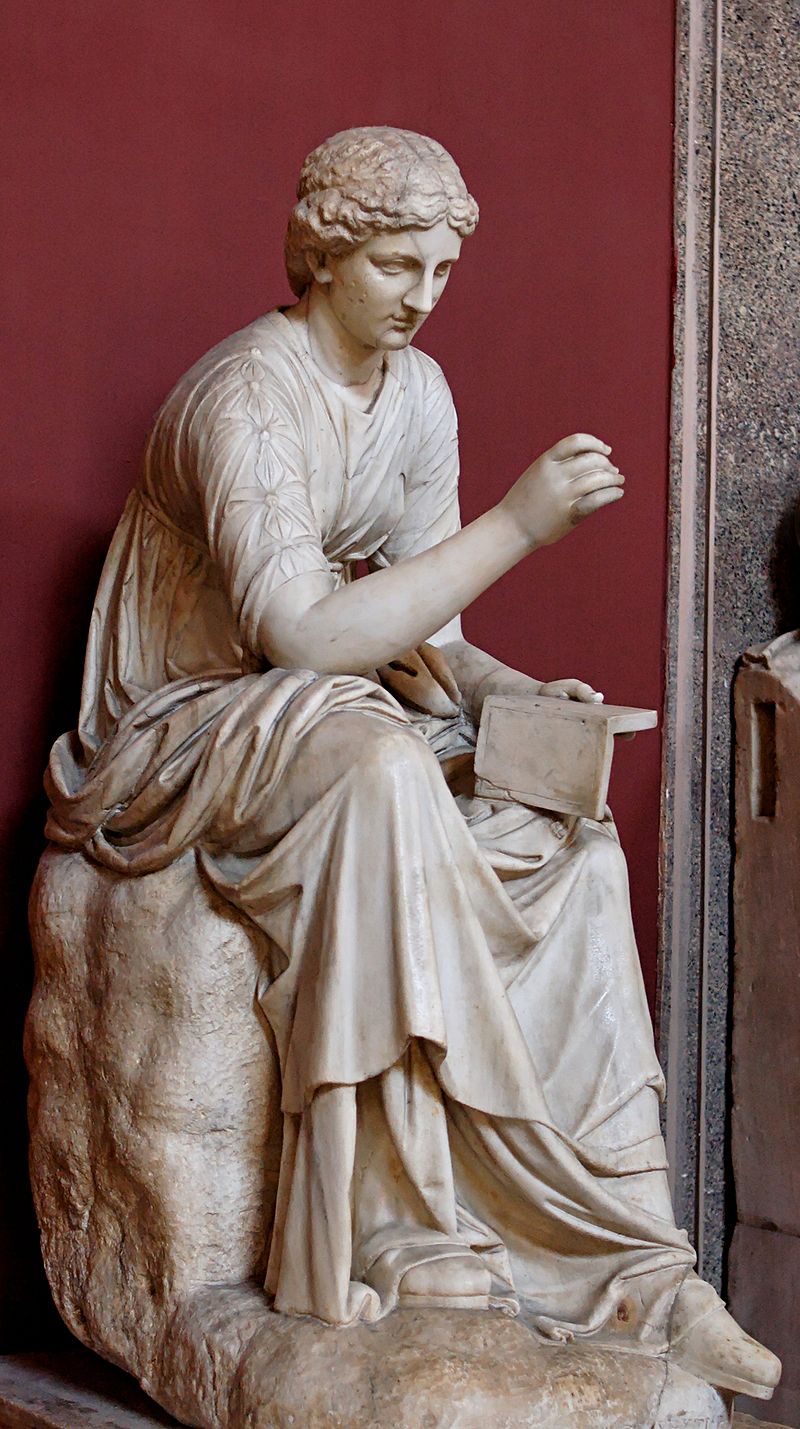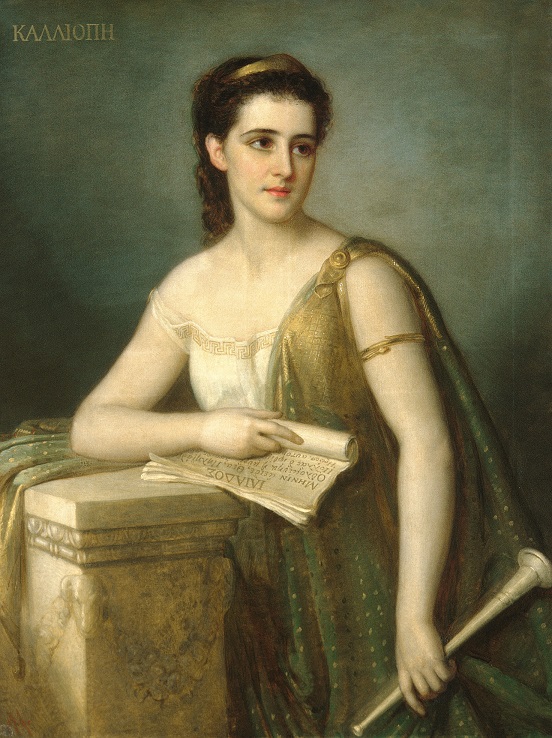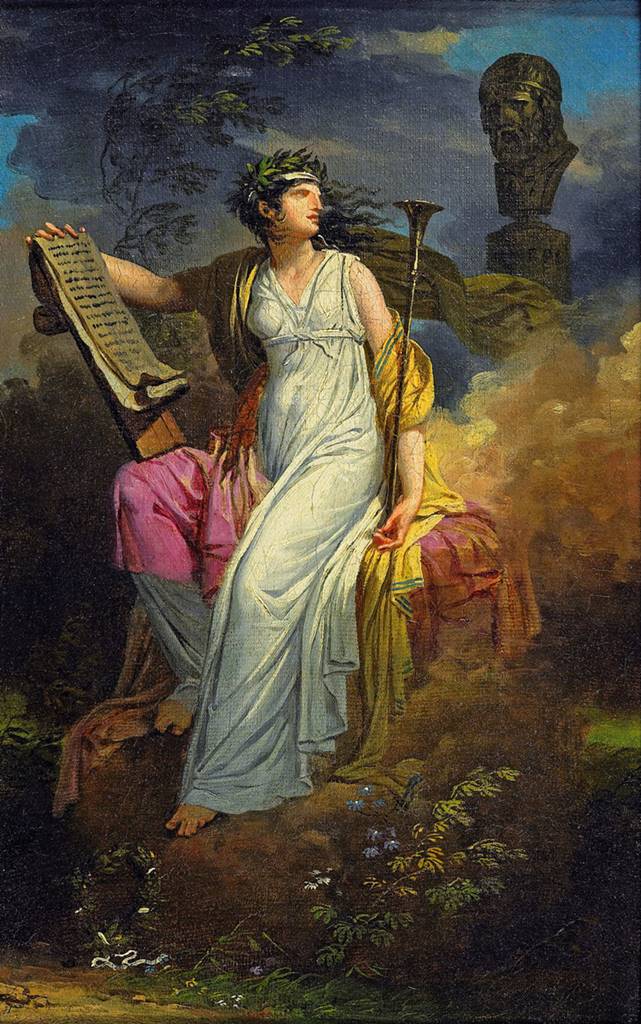Calliope
Ever wonder where our greatest speakers and musicians get their inspiration from? Look no further. In this lesson, we learn about Calliope - the Ancient Greek Muse of Eloquence and Epic Poetry.
Calliope: Muse of Eloquent Speech and Epic Poetry
Greek mythology was filled with gods and spirits who influenced events and people living on earth. Among these supernatural beings were nine sisters called Mousai, or Muses. The Muses were daughters of the chief Greek god Zeus and his 'aunt,' the Titan Mnemosyne.
Mnemosyne was the Titan responsible for memory - one of the most important intellectual gifts possessed by humans. According to myth, Zeus lay with Mnemosyne for nine nights in a row. Each night she conceived a new Muse and Calliope was the firstborn daughter. The Muses' main power was to inspire humans in writing, music, and the arts.
Who was Calliope?
Calliope is the Muse of Eloquence and Epic Poetry. She is also the Muse of music, song, and dance. Her name, also spelled 'Kalliope,' means 'beautiful-voiced' in Ancient Greek. She bears no relation to another Calliope in Greek mythology who was a daughter of the river god Nestus.
Most of what we know about Calliope comes from the writer Hesiod and his great work the Theogony which was written between 750 and 650 BC. Later writers, including Ovid and Virgil, also included her in their stories. Little is known about her early life, but she is frequently pictured as a beautiful young woman holding a writing tablet or scroll.
She and her sisters were tutored in the arts by none other than Apollo - the patron god of music and poetry. Calliope rarely appears alone in Greek myths and is usually seen working with her sisters toward some end. Calliope and the other Muses frequented Mount Helicon where humans often worshiped them and asked for their assistance. Most of the time, however, the Muses lived on Mount Olympus where they attended to Zeus and the other major Greek gods.

Family Life
As with many ancient myths, there are varying descriptions of Calliope's relationships and family life. She is commonly represented as the mother of two famous sons - Linus and Orpheus. The boys' father is given as either Apollo or Oeagrus, King of Thrace. Linus became a famous musician who was the first to pair singing with the playing of the harp. Calliope's other son Orpheus led a tragic life. He was blessed with incredible musical talents.
His mother taught him to sing and play and Apollo gave him a golden lyre as a gift. His skills were so amazing that creatures, trees, and even stones would follow him to listen to his music. In time, Orpheus traveled to the underworld to rescue his wife Eurydice from death. His music warmed the cold hearts of Hades and Persephone who allowed him to leave with his wife. Unfortunately, his failure to heed their directions resulted in her return to the underworld and his everlasting grief.
Calliope in Greek Mythology
Calliope was rarely spoken of as an individual but she is named as present, and spoken to by Thetis, when the Muses sang their dirges during the funeral rites of Achilles. Calliope was also certainly present when the Younger Muses were victorious in their contests with the Sirens and Pierides. Indeed, Calliope was said to be the Muse who caused the Pierides to be transformed into magpies after they had had the impudence to challenge Calliope and her sisters.

Sources
GREEK
Hesiod, Theogony - Greek Epic C8th - 7th B.C.
Homerica, The Origin of Homer and Hesiod - Greek Epic B.C.
Pindar, Fragments - Greek Lyric C5th B.C.
Greek Lyric I Terpander, Fragments - Greek Lyric C7th B.C.
Greek Lyric I Alcman, Fragments - Greek Lyric C7th B.C.
Greek Lyric III Stesichorus, Fragments - Greek Lyric C7th - 6th B.C.
Greek Lyric IV Bacchylides, Fragments - Greek Lyric C5th B.C.
Greek Lyric V Timotheus, Fragments - Greek Lyric C5th B.C.
Aeschylus, Fragments - Greek Tragedy C5th B.C.
Plato, Phaedrus - Greek Philosophy C4th B.C.
Plato, Republic - Greek Philosophy C4th B.C.
Apollodorus, The Library - Greek Mythography C2nd A.D.
Apollonius Rhodius, The Argonautica - Greek Epic C3rd B.C.
Diodorus Siculus, The Library of History - Greek History C1st B.C.
Strabo, Geography - Greek Geography C1st B.C. - C1st A.D.
Pausanias, Description of Greece - Greek Travelogue C2nd A.D.
The Orphic Hymns - Greek Hymns C3rd B.C. - C2nd A.D.
Philostratus the Younger, Imagines - Greek Rhetoric C3rd A.D.
Callistratus, Descriptions - Greek Rhetoric C4th A.D.
Quintus Smyrnaeus, Fall of Troy - Greek Epic C4th A.D.
Nonnus, Dionysiaca - Greek Epic C5th A.D.
ROMAN
Hyginus, Fabulae - Latin Mythography C2nd A.D.
Hyginus, Astronomica - Latin Mythography C2nd A.D.
Ovid, Fasti - Latin Poetry C1st B.C. - C1st A.D.
Propertius, Elegies - Latin Elegy C1st B.C.
Cicero, De Natura Deorum - Latin Rhetoric C1st B.C.
Seneca, Medea - Latin Tragedy C1st A.D.
Statius, Thebaid - Latin Epic C1st A.D.
Statius, Silvae - Latin Poetry C1st A.D.
BYZANTINE
Suidas, The Suda - Byzantine Greek Lexicon C10th A.D.
OTHER
"study"













